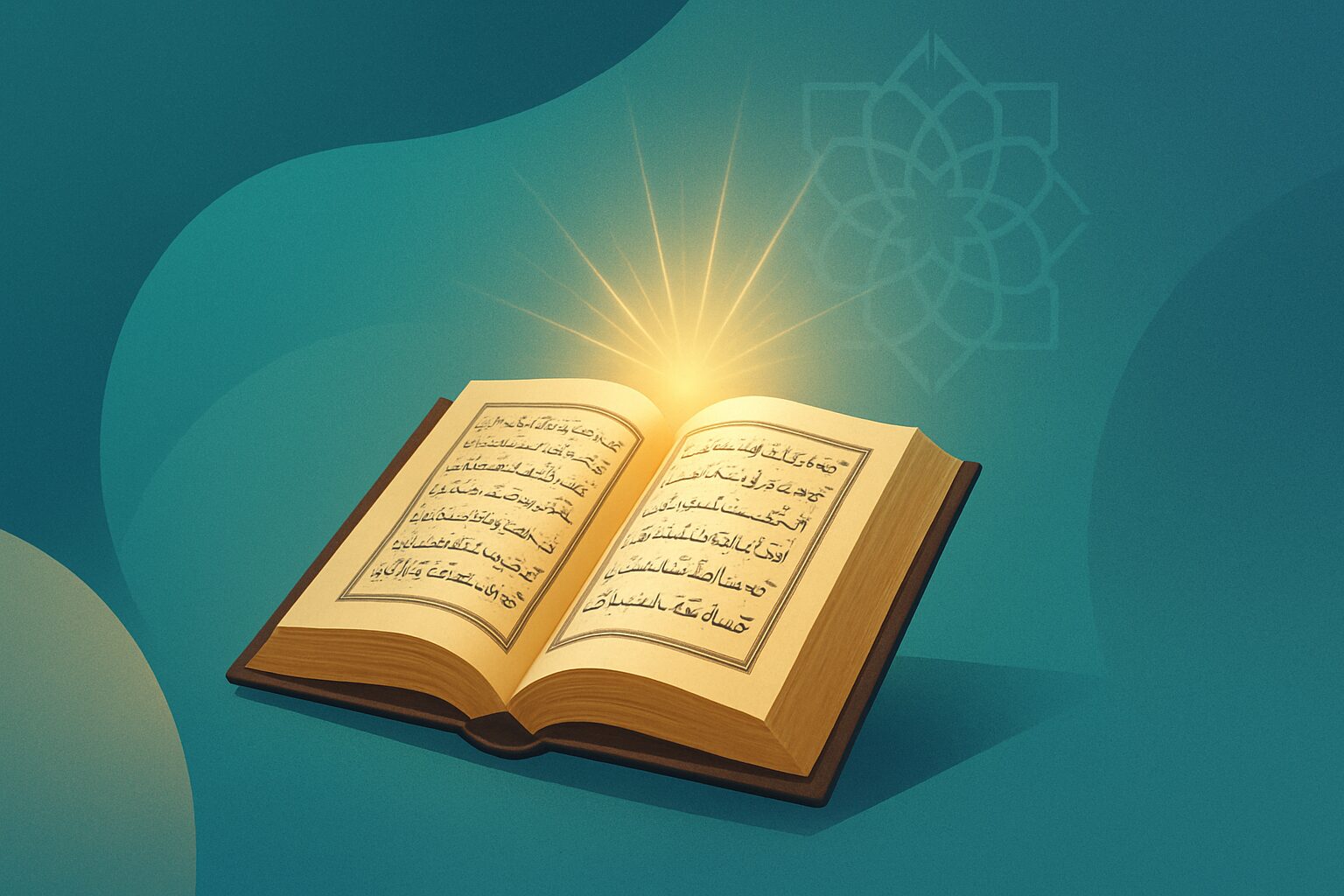Salaamun alaykum, dear readers!
One of the teachings from Rashad Khalifa, the Messenger of the Covenant, was that not only was the prophet a literate man, but he was capable of writing. Whenever Quranic verses were revealed to Muhammad, he wrote them down by his own hand.
Keep in mind that this was never a revelation received by Rashad, but it is the logical conclusion drawn from both historical sources and Quranic text.
So the prophet was actually literate, and there are multiple pieces of evidence to suggest that.
Evidence from History
Even beyond the Quran, we can intuitively figure out that the prophet was not illiterate when realizing that he was a merchant who used numbers throughout his career. The numbers at the time were based on Arabic letters (with each letter representing a certain number), as there was no standard numerical system at the time, and this is known as gematria.
When you work as a seller of goods (which is what a merchant is), you have to keep records of transactions, verify agreements and contracts, and do calculations. So if the Arabic letters served as the numbers at the time, then the prophet had to work with Arabic letters throughout his career as a merchant for recordkeeping.
Thus, it is very unlikely that a merchant at the time would not be familiar at least with how the Arabic alphabet looks like. He had to be, at the very least, partially literate.
Evidence from Hadith
Before reviewing the Quranic evidence, let us first review what the Hadith says. Muhammad was narrated to have written or attempted to have written documents in a multiplicity of Hadith narrations after he became a prophet (Bukhari Hadith, no. 114, 65, 4431, 4432, and 5669; Sunan Abu Dawud no. 2999 and 5136, etc).
In fact, Hadith number 4432 from Bukhari stands out because it shows the prophet on his deathbed wanting to write a final statement for the people so that they would not go astray.
Some of the companions refused out of concern for the prophet due to him being seriously ill, and because the Quran alone was enough as guidance. But others wanted to give the prophet writing material so that the prophet can write the final statement for them.
- Why would any companion offer the prophet writing material if it was common knowledge that he cannot read or write? That’s because the prophet was not an illiterate man, he knew how to read and write.
Evidence from Quran
As for the Quran, the very first revelation the prophet received is verse 1 of Surah 96, which says: “Read, in the name of your Lord who created.” Thus, the prophet was commanded to read the Quran.
That means even if the prophet was illiterate before, God is ordering the prophet to read the Quran from now on.
Not only that, but God is telling the prophet in the Quran that He will make Muhammad read:
- [87:6] We will make you read (sanuqriuka), then you will not forget.
In all fairness, the word “sanuqriuka” can linguistically mean both read or recite. However, verse 96:3-4 (which is part of the very first revelation of the Quran received by the prophet) states:
- [96-3-4] Read (iqra), and your Lord is Most Noble, the one who taught by the pen.
Thus. immediately after the prophet was commanded to “iqra”, God said he taught the human beings by the pen. This clarifies that the command of “iqra” that was directed at the prophet includes reading as well, not just reciting, because one can only read things that are written by the pen.
And if the prophet was capable of writing, then there would be no reason for the prophet to not write down a revelation from the Quran as soon as he received it from God.
Verse 96:4 states that God is the one who “taught by the pen“. Moreover, God swears by the pen in verse 68:1. Thus the prophet Muhammad knew full well of the importance of writing and documenting important things.
The prophet had zero excuse not to write down the Quran with his own hand if he was able to read and write.
- Hence, Rashad Khalifa came to the conclusion that the prophet wrote down the Quran with his own hand at some point during his life.
- Verse 75:17 states that God is responsible for the Quran’s compilation, therefore Rashad concluded that God conveyed to the prophet the details of how He wants the Quran to be compiled, and the prophet wrote down the Quran according to those details.
What Does “Ummi” Mean?
The Quran, however, in a few places such as verse 7:157, says that Muhammad was an “ummi” prophet.
God in the Quran does not use the word “ummi” to mean illiterate.
Rather, God uses the word “ummi” to mean a group of people who have never received a scripture or messenger before the Quran, also known as Gentiles.
Another meaning of “ummi” that is used in the Quran is someone who lacks knowledge about the scripture. This can apply even to Jewish people, or Christians and Muslims too, because it’s possible to grow up as a Jew, Christian, or Muslim, but have little understanding of their own scriptures.
Usage of Ummi as “Gentile”
Verse 3:20 instructs to asks the ones who received the scripture, as well as the “ummiyoon” if they have submitted. In this verse, the word “ummi” is used as the opposite of “those who were given the Book”. Thus, “ummi” here refers to gentiles, or non-Jews, as non-Jews were not given a Book from the time of Israel to the time of Muhammad.
- [3:20] So if they argue with you, then say, “I have submitted my face to God, as well as whoever followed me.” And say to the ones who were given the Book, as well as the ummiyoon (those who were not given the Book), “Have you submitted yourselves?” If they submitted, then certainly they have accepted guidance. But if they turned away, then only upon you is the clear conveyance, and God is Seeing of the servants.
Verse 7:157 tells the Children of Israel that Muhammad is the “ummi prophet” found in the past scriptures, and tells the Children of Israel to follow the “light” that was brought down to him.
The Old Testament (namely Deuteronomy 18 and Isaiah 42) mentions a future prophet who will be a “light to the Gentiles” but doesn’t mention or predict the coming of an illiterate prophet. Thus, the word “ummi” in this verse means a gentile (non-Jew).
- [7:157] “The ones who follow the messenger, the ummi (gentile) prophet whom they find written in the Torah and Injeel with them……So the ones who believed in him, honored him, and supported him, and followed the Light which was brought down with him, those are the successful ones.”
Usage of Ummi to Mean “Those Who Do Not Know Their Book”
Verse 2:78-79 indicated that among the ones who write the Book with their hands for distortion purposes are the “ummi’” who do not know the Book.
They can read, write, and distort God’s scriptures, but they lack knowledge about God’s scripture, hence they are called “ummi”.
- [2:75-79] Do you then hope that they would believe for you, while certainly there has been a group of them who hear God’s word, then distort after when they understood it, while they know? …And among them (the distorters) are ummiyoon who do not know the Book, except what they long for, and they do not but assume. So woe to the ones (distorters) who write the Book with their hands, then say, “This is from God,” for they may purchase a cheap gain with it…
So the prophet meets the criteria of both definitions of ummi in the Quran: Gentile (non-Jew), and someone who is scripturally illiterate (lacks basic knowledge about past scriptures).
That’s because prophet Muhammad used to not know what scripture was, nor did he know anything about Islam or faith in God (verse 42:52).
The Quran said he used to not recite or inscribe any scripture in the past (verse 29:48), and used to not know anything about the information of previous prophets which was given to him in the Quran (11:49).
This means before he was given the Quran, he was completely unfamiliar with the contents of the past scriptures, and this is why he meets both the first definition (gentile) and the second definition of “ummi” in the Quran.
[29:48] And you used to neither recite any Book before it, nor inscribe it with your right hand. The falsifiers would then definitely have doubted.
[42:52]…You neither used to know what the Book was, nor the faith, but instead, We made it a light with which We guide whom We will of Our servants; indeed you definitely guide to a straight path.
Conclusion
So in conclusion, the prophet Muhammad was not an illiterate person for his entire life, he learned to read and write at some point if he didn’t grow up learning to read and write, as per what the Quran and even other Hadith states.
Many want to make a miracle out of the fact that the Quran is a great piece of Arabic literature, and a convenient way to do so is to believe that the prophet was illiterate for his whole life.
But that is not where the Quran’s greatest miracle is.


Leave a Reply